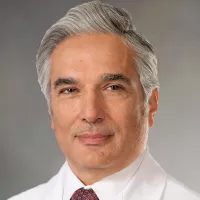Francisco G. Cigarroa is a third-generation physician. After graduating from J.W. Nixon High School in Laredo, Texas, he attended Yale University, where he graduated in 1979 with a bachelor’s degree in biology. Cigarroa earned his medical degree in 1983 from The University of Texas Southwestern Medical Center at Dallas with honors. During his postgraduate training, he became chief resident in General Surgery at Massachusetts General Hospital in Boston and completed fellowships in both Pedatric Surgery and Transplantation Surgery at Johns Hopkins Hospital in Baltimore.
Upon completing his surgical training, Dr. Cigarroa joined the faculty of The University of Texas Health Science Center at San Antonio in 1995 where he served as director of pediatric surgery before serving as president of the institution from 2000 -2009. As a Pediatric and Transplant Surgeon he established a multidisciplinary pediatric transplant program focused on kidney, liver and intestinal transplants with outstanding outcomes. In 2009, Dr. Cigarroa became the first Hispanic to be named chancellor of The University of Texas System. As chancellor, he oversaw one of the largest public systems of higher education in the nation, which consists of nine universities and six health institutions. He was also vice chairman for policy on the Board of Directors of The University of Texas Investment Management Company. As Chancellor, Dr. Cigarroa’s leadership was critical in the establishment of the Dell Medical School at the University of Texas at Austin, The University of Texas Rio Grande Valley, a Medical School in South Texas as part of The University of Texas Rio Grande Valley, and enhancing engineering across the University of Texas System. His leadership was also critical in the legislation that allowed the University of Texas Rio Grande Valley to be eligible for Permanent University Funds as well as enhancing the stewardship of the University of Texas West Texas Lands. In January 2015, Dr. Cigarroa completed his tenure as Chancellor of the University of Texas System and was named the Director of Pediatric Transplantation at the University of Texas Health Science Center at San Antonio. He holds the Ashbel Smith Professorship in Surgery from the University of Texas at Austin. Dr. Cigarroa is a Regent’s Special Liaison to the University of Texas Rio Grande Valley and its Medical School. He is the recipient of the Carlos and Malú Alvarez Distinguished University Chair at the University of Texas Health Science Center at San Antonio.
In 2011, Dr. Cigarroa was awarded the Massachusetts General Hospital Trustees’ Medal in recognition of his contributions to the advancement of the practice of medicine and patient care. He also was the recipient of the International Recognition Award by the Denton A. Cooley, M.D. Cardiovascular Society. Dr. Cigarroa is a member of several prestigious societies, including the American College of Surgery, the American Pediatric Surgical Association, The Association of Transplant Surgery, the Institute of Medicine, the American Board of Surgery and the American Academy of Arts and Sciences. He is also an honorary member of the National Academy of Science in Mexico. In 2003, President George W. Bush appointed him to serve on the President’s Committee on the National Medal of Science. He was elected in 2010 to serve on the Yale Corporation, the university’s governing board. He also served as the 2010 president of the Academy of Medicine, Engineering and Science of Texas. Dr. Cigarroa served on the National Research Council Committee on Research Universities and on the American Academy Commission on the Humanities and Social Sciences. In addition, President Barack Obama appointed Dr. Cigarroa to serve as a commissioner on the White House Initiative on Educational Excellence for Hispanic Americans. In 2014, Dr. Cigarroa was appointed as a trustee of the Josiah Macy Jr. Foundation and the Ford Foundation.
Professional Links
Affiliations
University of Texas Southwestern Medical Center
University of Texas Health Science Center
University of Texas Rio Grande Valley
Selected Publications

